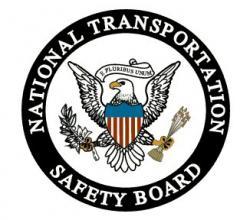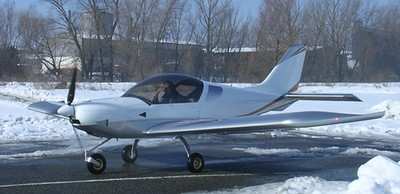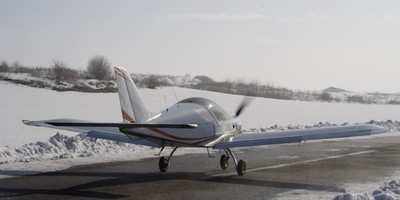This Could Have Gone A LOT Worse
 An LSA CFI earned her hourly rate
the hard way last month when an aircraft checkout and stall series
turned into an impromptu lesson in spin recovery... and was
terminated by an off-field landing with injuries and damage to the
airframe.
An LSA CFI earned her hourly rate
the hard way last month when an aircraft checkout and stall series
turned into an impromptu lesson in spin recovery... and was
terminated by an off-field landing with injuries and damage to the
airframe.
NTSB Identification: ERA10LA098
14 CFR Part 91: General Aviation
Accident occurred Monday, December 21, 2009 in Suffolk, VA
Aircraft: Czech Aircraft Works Sportcruiser, registration:
N524SC
Injuries: 1 Serious, 1 Minor.
This is preliminary information, subject to change, and may contain
errors. Any errors in this report will be corrected when the final
report has been completed.
On December 21, 2009, at 1304 eastern standard time, a Czech
Aircraft Works Sportcruiser, special light sport airplane, N524SC,
operated by Tidewater Flight Center, was substantially damaged
during collision with trees and terrain following an inadvertent
spin and dive recovery near Suffolk, Virginia. The certificated
private pilot sustained minor injuries, and the certificated flight
instructor was seriously injured. Visual meteorological conditions
prevailed for the local instructional flight that originated at
Chesapeake Regional Airport (CPK), at 1245, and was conducted under
the provisions of 14 Code of Federal Regulations Part 91.
In both a telephone interview and a written statement, the pilot
stated that he was recently issued his private pilot certificate
and that the purpose of the flight was to be “checked
out” in the Sportcruiser airplane. After departure, he flew
the airplane a short distance to the training area to perform basic
flight maneuvers. While flying about 2,500 feet mean seal level
(msl); the pilot initiated a power-off stall. At the onset of the
stall, he added power, the airplane “yawed left,” he
applied right rudder and the airplane “snapped into a tight
spin to the left.”
The instructor announced that she had the flight controls, and
the pilot released the controls. The instructor verbalized her spin
recovery control inputs as she performed them, but the airplane
continued to spin and lose altitude. The airplane eventually
stopped spinning, and during the post-spin dive recovery, the
airplane struck trees and terrain, and came to rest inverted.
The flight instructor was interviewed by telephone and also
provided a written statement. Her statement was consistent with the
pilot’s. Both she and the pilot stated that it was a
“surprise” how quickly the airplane rolled into the
spin after the stall. Each of them also described the handling
characteristics of the airplane as “touchy” and
“sensitive” to control inputs, but during slow flight
the controls were “mushy.”
A review of Federal Aviation Administration (FAA) airman records
revealed that pilot held a private pilot certificate with a rating
for airplane single engine land. His most recent FAA second class
medical certificate was issued February 26, 2008. The pilot
reported 99 total hours of flight experience with no prior
experience in the accident airplane make and model.

SportCruiser File Photo
A review of FAA airman records revealed that the flight
instructor held a commercial pilot certificate with a rating for
airplane single engine land and instrument airplane. She also held
a flight instructor certificate with a rating for airplane single
engine land and instrument airplane. Her most recent FAA second
class medical certificate was issued July 11, 2008. The flight
instructor reported 470 total hours of flight experience with 20
total hours of experience in the accident airplane make and
model.
According to FAA and maintenance records, the airplane was
manufactured in 2007 and had accrued 868 total aircraft hours. Its
most recent conditional inspection was completed on November 17,
2009, at 82 total aircraft hours.

SportCruiser File Photo
At 1300, the weather reported at CPK, 10 miles east of the site,
included scattered clouds at 4,900 feet and winds from 280 degrees
at 6 knots. The visibility was 10 miles. The temperature was 7
degrees Celsius (C) and the dew point was -4 degrees C. The
altimeter setting was 30.09 inches of mercury.
Examination of the airplane at the scene by an FAA inspector
revealed substantial damage to the engine compartment, and partial
separation of the wings. The airplane was recovered from the site
on December 29, 2009, and was scheduled for a detailed examination
at a later date.
 ANN FAQ: Contributing To Aero-TV
ANN FAQ: Contributing To Aero-TV Aero-News: Quote of the Day (12.10.25)
Aero-News: Quote of the Day (12.10.25) ANN's Daily Aero-Term (12.10.25): North Atlantic High Level Airspace (NAT HLA)
ANN's Daily Aero-Term (12.10.25): North Atlantic High Level Airspace (NAT HLA) Airborne 12.08.25: Samaritans Purse Hijack, FAA Med Relief, China Rocket Fail
Airborne 12.08.25: Samaritans Purse Hijack, FAA Med Relief, China Rocket Fail Airborne-Flight Training 12.04.25: Ldg Fee Danger, Av Mental Health, PC-7 MKX
Airborne-Flight Training 12.04.25: Ldg Fee Danger, Av Mental Health, PC-7 MKX





